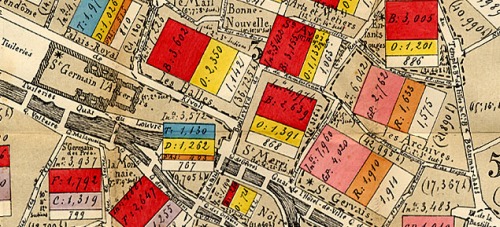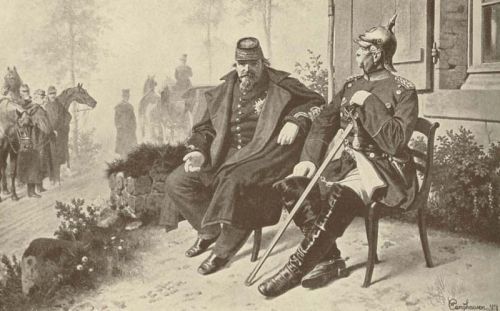Electoral maps use simple colors and shapes to illustrate voter preference. But by their very nature this simplicity belies a complex story of the class struggle, self interest, power, ideology, and money that influence politics. Few maps, though, tell as important a story as the one above–a map of the Paris parliamentary elections of 1869, which shows the changing political tide that would lead to domestic turmoil, and eventually to a major international war and the fall of the Second French Empire.
As Napoleon Bonaparte’s nephew, Charles Louis-Napoleon Bonaparte was born into a prominent and infamous family. His family’s earlier fall from grace meant he was raised in exile, in Italy and Great Britain. But when the Second Republic was established in France in 1848, Louis-Napoleon was free to return to his ancestral country and quickly became the clear Bonapartist candidate for the throne. He was able to win a landslide victory in the Second Republic’s first presidential elections, and despite spending nearly all his life outside the country, was elected as the first-ever President of the French Republic. Only three years later, in 1851, he led a successful coup against his own government and seized dictatorial powers. One year later, the Republic was abolished, and Charles Louis-Napoleon Bonaparte became Napoleon III, Emperor of the French.
The 1850s proved fruitful for Napoleon III. Not only had he seized and solidified imperial powers, but he also married and produced an heir, and led the country into a successful and victorious conflict with Russia in the Crimean War to increase his prestige at home and abroad. But the 1860s proved more difficult for his regime. Domestic political opponents forced him to reduce his authoritarian powers; his invasion of Mexico, though initially successful, was defeated and his puppet ruler executed; Victor Hugo was serving as the eloquent pen of the exiled Republican politicians; and Napoleon III’s war against Austria in support of Italian Unification alienated his Catholic political support, presaging later difficulties. Most importantly, Napoleon III could only watch as Prussia gained power in Germany throughout the decade.
The elections of 1863 saw anti-Bonapartist factions gain seats in the parliament, demanding more liberties from the Empire. Given his foreign policy failures, Napoleon III lacked the legitimacy to oppose them, and further liberties were granted. Socialism was taking root among the working classes, who came to oppose the monarchy despite Napoleon III’s explicit pro-labor positions. These pressures came to fruition in the elections of 1869.
The map above was developed by Leon Montigny, a French mapmaker and author. It depicts the electoral results of the French parliamentary elections in May and June 1869. Montigny demarcates the boundaries of each Parisian neighborhood by mapping the streets that form their boundaries. Over each area, he provides a rectangle whose area is proportional to the number of voters in the district, with each square centimeter representing 1,000 voters. Each neighborhood’s rectangle is subdivided into smaller rectangles, colored to represent the parties that received votes. Click here or on the picture above to see the full map.
In this map, the candidates representing Napoleon III’s government are represented in yellow; the anti-Bonapartist opposition from the previous election are in pink and blue; and the socialists are represented in orange. Even a fleeting glance at the map shows the explicit failure of the Emperor’s politics–his government’s candidates came in a distant second or third in nearly every neighborhood. In some areas, they received almost no votes at all.
Socialists seem to have resided for the most part in the southern and east-central parts of the city, while the pro-government voters apparently lived in the city center, potentially near their places of employment in government offices. Overall, the city outskirts voted overwhelmingly against the government. It was the end of Napoleon III’s absolutist rule.
The successes of the opposition in the 1869 election forced Napoleon III to award multiple concessions, transforming his regime from an absolutist empire to a much more liberal one. But while the domestic opposition seemed content for the moment, the exiled Republicans were more determined than ever to overthrow the Empire. Facing dissent at home and abroad, and a dwindling prestige and legitimacy, Napoleon III turned to a frequently-used tactic by unpopular leaders–war.
As Napoleon III’s domestic power had weakened, Prussia’s military power had grown. In 1866, Otto von Bismarck and Helmuth von Moltke had led Prussia to victory over Austria, consolidating their country’s leadership of the fragmented German states. Now, in 1870, Napoleon III looked toward Prussia as a way to again legitimize his rule in the face of unyielding Republican opposition. His wife, the Empress Eugenie, was quoted as saying “If there is no war, my son will never be emperor.” If Napoleon III could defeat Prussia and show his strength, he could leverage it into renewed domestic political strength and the preservation of his imperial dynasty.
In 1870, on the tenuous pretext of opposing a Hohenzollern appointment to the throne of Spain, the French Empire declared war on Prussia, beginning the Franco-Prussian War. Throughout the 1860s, Prussia had built a modern, mobile army under the steady leadership of von Moltke and Albrecht von Roon, and whatever challenges remained in its development were solved during the war with Austria four years earlier. Now, the Prussians and their German allies stormed into France at the head of a remarkably modern military. The French suffered a staggering series of defeats until, on September 2, 1870, the French army was routed at the Battle of Sedan, and Napoleon III himself was captured. Two days later, the French parliament deposed him and declared the Third Republic.
A drawing of Bismarck conversing with Napoleon III after the latter’s capture in the Battle of Sedan on September 2, 1870.
After Sedan, Paris held out under siege for several months, leading to many more deaths and a great deal of destruction. The treaty that finally ended the war awarded Prussia the French provinces of Alsace and Lorraine. Using the prevailing German nationalist feelings to his advantage, Bismarck formalized the establishment of the German Empire, which was officially declared in the occupied Palace of Versailles, further diminishing France as the Continent’s leading military power. Defeated and deposed, and having led his country to ruin, Napoleon III went into exile in Britain. He died there on January 9, 1873. He is buried in Saint Michael’s Abbey, in Farnborough, Hampshire, England, along with his wife, and his son who died while serving with the British Army in the Boer War.
Montigny’s map, above, depicts with startling clarity one of the most important turning points in Napoleon III’s political career. His defeat in the elections of 1869 forced him to seek domestic political legitimacy through international conflict. But like many leaders after him, Napoleon III found that he had more than met his match in his enemy of choice. The results of Napoleon III’s war would form one of the most important causes of World War One.
I came across Montigny’s map via Michael Friendly’s excellent site here.


Interview Request
Hello Dear and Respected,
I hope you are fine and carrying on the great work you have been doing for the Internet surfers. I am Ghazala Khan from The Pakistani Spectator (TPS), We at TPS throw a candid look on everything happening in and for Pakistan in the world. We are trying to contribute our humble share in the webosphere. Our aim is to foster peace, progress and harmony with passion.
We at TPS are carrying out a new series of interviews with the notable passionate bloggers, writers, and webmasters. In that regard, we would like to interview you, if you don’t mind. Please send us your approval for your interview at my email address “ghazala.khi at gmail.com”, so that I could send you the Interview questions. We would be extremely grateful.
regards.
Ghazala Khan
The Pakistani Spectator
http://www.pakspectator.com
Heya i am for the primary time here. I found this board and I find It really useful & it helped me out a lot. I’m hoping to give something back and aid others like you helped me.
I have to thank you for the efforts you have put in writing
this website. I’m hoping to check out the same high-grade blog posts from you later on as well.
In fact, your creative writing abilities has motivated me to
get my own, personal blog now 😉
Heya i’m for the primary time here. I came across this board
and I find It truly useful & it helped me out a
lot. I am hoping to present something again and help others such as you helped me.
I really do agree with you.
I think that this is all fake and no one knows what really happened back then.
I love the efforts you have put in this, thanks for all the great articles.
I like this site very much, Its a rattling nice post to read and obtain info .
Thanks for some other informative web site. Where else may I get that kind of info written in such an ideal way? I have a mission that I’m simply now running on, and I have been on the look out for such information.
It’s actually a cool and useful piece of information. I am glad that you just shared this helpful information with us.
Please keep us up to date like this. Thanks for sharing.